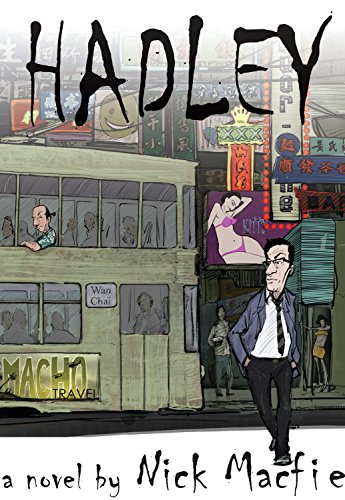Hong Kong-based Earnshaw Books is one of the more notable independent publishers in East Asia. Founded in 2007 by English journalist, businessman, and musician, Graham Earnshaw, the company grew out of his Tales of Old China website. Most of the early titles were reprints of classics, but Earnshaw Books has since moved toward publishing original works and covering a wider range of topics. Notable titles include Décadence Mandchoue, the autobiographical memoir of Sir Edmund Backhouse’s life in Peking, and Douglas Clark’s Gunboat Justice, a magnificent trilogy examining extraterritoriality during the treaty port days (also available in a single abridged edition as Justice by Gunboat).
* * *

How did Earnshaw Books come about?
The imprint started with the idea of re-printing old and out-of-print books by foreigners in and about China in another era, the main point of which was to show that others have been this way before and had very similar experiences. Plus of course a longing for immortality.
What are your best-selling books?
Stateless in Shanghai, a memoir of growing up in Shanghai through into the early years of communist rule, by Liliane Willens. But the List is marked by steady and modest sales across the board.

Is there truth in the old adage that sex sells? In other words, are your two best-selling titles Richard Burger’s Behind the Red Door: Sex in China and Edmund Backhouse’s magnificently insane Manchu Decadence?
Not particularly. Both those titles are steady (see above), but not breakout in sales terms.
Are there any promotional activities that have worked well for you?
Author involvement seems to be crucial.
Which of your titles involved the most amount of work?
We are active editors of manuscripts when they need it. It is rare for a manuscript to just breeze through, but it happens. Christopher New’s Gage Street Courtesan springs to mind. Most amount of work? Surely Edmund’s memoir which took us – particularly editor Derek Sandhaus – two years to get right from the scribblings and typewritten pages we extracted from the Bodleian Library.
Which book has generated the most controversy?
Again, the Edmund Backhouse memoir, and that was one of the main reasons to publish it. Plus I think he was badly treated by his biographer, Hugh Trevor-Roper, for reasons I suspect were sub-consciously based on sexual jealousy.

What are your main criteria for taking on a book?
That it contributes something to the richness of the story or the understanding of China from some perspective.
What would be a dream manuscript to arrive on your desk?
Jonathan Spence’s latest work, with a covering letter pleading for me to accept it.
How many people are involved in Earnshaw Books?
Vast numbers.
On your website you mention that you’re going to launch a historical fiction series. Was Alice Poon’s The Green Phoenix the first in the series?
Yes, and not the last. We have since published Finding the Way by Wayne Ng, and Harry Miller’s Southern Rain, is poised for launch.

Tom Carter has called Chris Taylor’s Harvest Season “tragically under-appreciated” and I couldn’t agree more. It really deserves to be a modern classic. Are there any other titles which you feel deserve much greater notice than they have received?
Well, all of them. But I would say the masterwork so far has been Douglas Clark’s history of extraterritoriality, Gunboat Justice. Superb scholarship and fantastic story-telling.
I’ve been thinking about Camphor Press doing anthologies, but they seem like perhaps a little too much work. You’ve done two anthologies, Unsavory Elements and While We’re Here, with the former receiving quite a lot of attention. What was your experience of publishing these?
One of my main reasons for doing book publishing is the richness of the experience of dealing with authors, and so anthologies provides a quick multiplier effect.
What are some Chinese historical periods and geographical regions which you think are deserving of greater coverage?
In English? The 1950s.
What are some of your recent and upcoming releases?
We have an active pipeline covering a wide range of topics and genres. Watch this space.
Given the struggle we small publishers have to make a dollar, it’s not financially feasible to commission artwork on a regular basis. I assume your cover art is mostly in-house. What are some exceptions to this?
All cover art is done in-house. The exceptions were the covers for the wonderful Hadley trilogy of novels by Nick Macfie, drawn for almost a pittance by Timothy Mcevenue.

Have any of your publications been translated into Chinese?
Yes. Edmund particularly did very well in Chinese, though he suffered some painful cuts in sensitive places in the mainland edition.
Who are your typical customers?
Excellent individuals with superb taste in books.
Among the reprints from the Old China days, do you have any favourites? I think my pick would be Shanghai Lawyer.
Absolutely agree. Another Doug Clark work. He took one of the best of the old China books and made it three times better by uncovering the details behind all the scandals.
* * *
Visit the Earnshaw Books website to see the great selection of titles on offer.
Earnshaw titles reviewed on Bookish Asia include While We’re Here, Intruder in Mao’s Realm, The Green Phoenix, Shanghai Lawyer, A Decent Bottle of Wine in China, and The Formosa Fraud.
